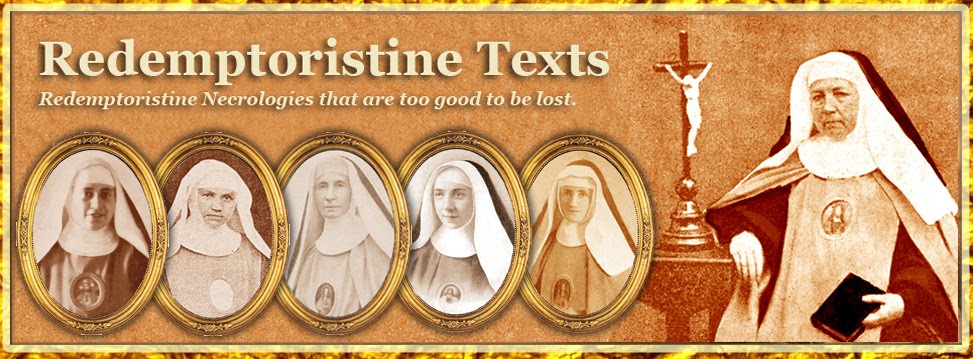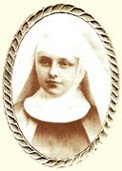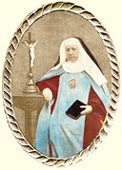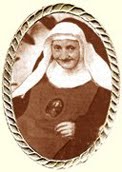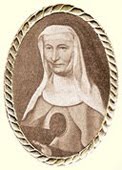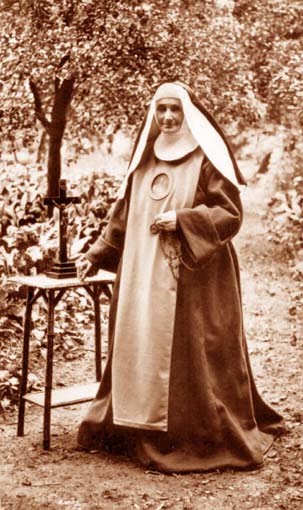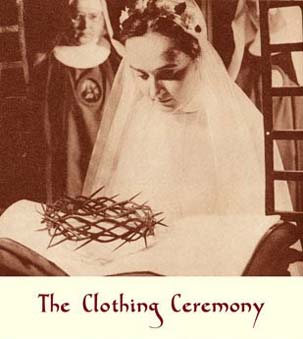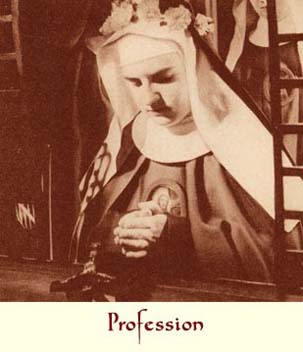Sister Marie-Gertrude was born in Malmédy (Prussian Rhineland) on 14th April 1858. At the age of four she lost her father. Left alone, her mother chose a pious young person to educate her four small daughters. Emma, the third in the family, was of a weak and delicate complexion and showed a happy disposition towards piety. At the time of her first Communion a sudden illness put her life in danger and she prepared herself to make the sacrifice of her life, “quite happy,” she said, “to be going to see God.” But the hour had not yet come. Emma's health recovered and she made her first Communion with great devotion.
At the age of eighteen, Emma was sent to the Ladies of the Sacred Heart at Jette to finish her education there. Deprived of all the little indulgences of which she had been the object, and in view of the sickly and languid state of her childhood years, Emma could not endure the discipline of the Boarding school and stayed there only three months. Her mother then addressed herself to Miss * * *, the director of a house of education in Brussels, and begged her to be kind enough to receive her daughter as a boarder. Emma was admitted there and found in Miss M * * *, the sister of the Director, a second mother, who was pleased to form her in piety. Docile to her opinions, Emma began to be disgusted by the world and touched by grace, and so she conceived the project of entering the convent.
It was with these happy dispositions that the young lady went back to her family in Liége, where her mother had been staying for two years. Following the advice of her worthy mistress, Emma then chose a Redemptorist Father for her confessor. Divine Providence let her find a sure and illumined guide in Father * * *. Under the wise direction of this holy religious, she exercised herself in the practice of the virtues and made new progress in piety, in spite of the opposition and the semi-persecution that her mother forced her to undergo. Mrs. * * *, although a good Christian, was very opposed to a religious vocation and dreaded it for her daughter. Her fears sometimes made her a little difficult, but Emma patiently bore all her observations. After her return to Liége, she was received into the Community of the Holy Virgin and a little later, into the Third Order of Saint Francis. In concert with her younger sister Fanny who shared her tastes, Emma used pious ruses to deliver herself to her exercises of piety without the knowledge of her family. A love of prayer brought the two girls to transform all places where they found themselves into an oratory; they sometimes locked themselves into a cupboard to recite their rosaries, did their meditation in a carriage or on the railway, and when they were forced to go to the theatre, they withdrew to the bottom of the stall to pray there. When Emma and Fanny went on vacation to Malmédy, the rev. vicar, who knew of their love for Jesus in the Host, wishing to procure them the happiness of receiving communion frequently without attracting attention, had recourse to a little stratagem to call them to the church. When there was no one there, he would place a flowering plant at the window of the presbytery. Every morning the two sisters took a look. When they saw the happy sign, they hastened to go to the church to receive their beloved Lord.
Emma spent five years to Liége, always internally nourishing the desire to consecrate herself to God without being able to do so. With grace pressing her more urgently, she resolved to delay no longer in responding to the call of the Lord and asked her spiritual father to indicate the Order to her in which she could serve the divine Master with the most perfection. The Rev. Father * * * told her about the Redemptoristines. Emma would have liked to present herself to them immediately, but her wise director ordered her to wait one more year. This decision greatly afflicted the dear child and her grief increased even more when, some time later, Mrs. * * * announced to her that she had decided to go and live in Cologne where her two eldest girls had lived since their marriage. For poor Emma it was a real catastrophe, because being far from her director made her fear the extinction of her pious projects. But the apostle has said: “Diligentibus Deum omnia cooperantur in bonum.” – (Everything contributes to the good of those who love God). It was in a foreign country that Emma was to find the zealous guide who would help her defeat all obstacles by his advice. Fanny continued to share the same ideas, so the two sisters, on the opinion of their common director, began a novena in the Sacred Heart of Jesus. On the ninth day they made a request in writing which they placed in their mother's apartment. Eight days passed in an inexpressible anxiety for the two sisters. Mrs. * * * kept her silence, but during this time she consulted her brother who arrived from Malmédy. Emma and Fanny were called in and Mr. * * * informed them of their mother's consent. He said that Emma could enter religion immediately, but that Fanny had to wait six months.
The two girls had previously written to the Superior of the Redemptoristines of Louvain, and could not to present themselves without first sending them their portrait, so they hastened therefore to communicate the happy news to them.
On 19th February 1884, Emma entered the monastery of Louvain with the most fervent dispositions. From the very first day, her great spirit of poverty was noticed, when she gave up possession of the small objects she had brought, and handed them over to the Mistress of Educandes, not wanting, she said, to have more objects for her usage that the Professed Nuns.
However, as frequently happens, after some months of religion, the nature wished to rebel against grace, and Emma's childish character reappeared. She always appreciated the grace of her vocation and showed herself faithful to it, but her weakness of character and her penchant to natural affections were an obstacle to her perfection. However this was an opportunity for merit to her, because she worked to overcome her little faults. Admitted to the vesting on 19th February 1885, Emma received the name of Sister Marie-Gertrude of Jesus. A short time later, the young Novice was seized by an obstinate cough and a chest illness declared itself at the same time as an infection of her larynx. Her state began to worsen and the Reverend Mother warned Mr. * * * who asked for a consultation. It took place on 15th September, and from then on two physicians came together each week to visit the patient.
Towards the end of December, the Reverend Mother wished to procure to the dear Novice, whose death appeared imminent, the consolation of dying as the Bride of Jesus, and asked Mons the archbishop for permission to let her make her holy vows under condition, which His Eminence granted. On Sunday 4th January 1885 after asking for pardon, Sister Marie-Gertrude pronounced her holy vows in presence of the Community and received Extreme-Unction. Her happiness in being united to Jesus by closer ties seemed to have rallied her forces and her state improved, but it was for a short time. Soon the illness took its course and they had to abandon any hope of preserving her longer. The hour of the reward was about to sound for their dear Sister. She had suffered patiently and had never prayed to obtain her cure, preferring to abandon herself to God's good pleasure. Renouncing human consolations and out of respect for the Enclosure for which she had just taken her vows, she heroically refused to see her mother, who, by a parent's intervention, had obtained from Mons the archbishop permission to enter the Monastery to embrace her daughter one last time.
On the 20th, at about nine o’clock in the evening, the dear Novice called the Sister Infirmarian and told her in a feeble voice: “I believe I am going to die.” Indeed the agony was beginning. She then asked the Sister Infirmarian to thank all people who had helped her on her behalf, and to send a last farewell to her dear mother. At about eleven o’clock, the Community assembled at the bedside of the dying Novice, who preserved a perfect calmness to the end, joining in the pious aspirations that were suggested to her. She had distinguished herself during her short religious life by her obedience and her fidelity to the least observances. Shortly after midnight, on 21st January 1886, Sister Marie-Gertrude expired, and her innocent and pure soul went to be united to the choir of Virgins, to repeat with the lovable Saint Agnes, whose feast was beginning: “I am already contemplating what I desired, and I am already in possession of what I hoped for. I am united in Heaven to Jesus Christ whom I loved on earth with all my affection.”
At the age of eighteen, Emma was sent to the Ladies of the Sacred Heart at Jette to finish her education there. Deprived of all the little indulgences of which she had been the object, and in view of the sickly and languid state of her childhood years, Emma could not endure the discipline of the Boarding school and stayed there only three months. Her mother then addressed herself to Miss * * *, the director of a house of education in Brussels, and begged her to be kind enough to receive her daughter as a boarder. Emma was admitted there and found in Miss M * * *, the sister of the Director, a second mother, who was pleased to form her in piety. Docile to her opinions, Emma began to be disgusted by the world and touched by grace, and so she conceived the project of entering the convent.
It was with these happy dispositions that the young lady went back to her family in Liége, where her mother had been staying for two years. Following the advice of her worthy mistress, Emma then chose a Redemptorist Father for her confessor. Divine Providence let her find a sure and illumined guide in Father * * *. Under the wise direction of this holy religious, she exercised herself in the practice of the virtues and made new progress in piety, in spite of the opposition and the semi-persecution that her mother forced her to undergo. Mrs. * * *, although a good Christian, was very opposed to a religious vocation and dreaded it for her daughter. Her fears sometimes made her a little difficult, but Emma patiently bore all her observations. After her return to Liége, she was received into the Community of the Holy Virgin and a little later, into the Third Order of Saint Francis. In concert with her younger sister Fanny who shared her tastes, Emma used pious ruses to deliver herself to her exercises of piety without the knowledge of her family. A love of prayer brought the two girls to transform all places where they found themselves into an oratory; they sometimes locked themselves into a cupboard to recite their rosaries, did their meditation in a carriage or on the railway, and when they were forced to go to the theatre, they withdrew to the bottom of the stall to pray there. When Emma and Fanny went on vacation to Malmédy, the rev. vicar, who knew of their love for Jesus in the Host, wishing to procure them the happiness of receiving communion frequently without attracting attention, had recourse to a little stratagem to call them to the church. When there was no one there, he would place a flowering plant at the window of the presbytery. Every morning the two sisters took a look. When they saw the happy sign, they hastened to go to the church to receive their beloved Lord.
Emma spent five years to Liége, always internally nourishing the desire to consecrate herself to God without being able to do so. With grace pressing her more urgently, she resolved to delay no longer in responding to the call of the Lord and asked her spiritual father to indicate the Order to her in which she could serve the divine Master with the most perfection. The Rev. Father * * * told her about the Redemptoristines. Emma would have liked to present herself to them immediately, but her wise director ordered her to wait one more year. This decision greatly afflicted the dear child and her grief increased even more when, some time later, Mrs. * * * announced to her that she had decided to go and live in Cologne where her two eldest girls had lived since their marriage. For poor Emma it was a real catastrophe, because being far from her director made her fear the extinction of her pious projects. But the apostle has said: “Diligentibus Deum omnia cooperantur in bonum.” – (Everything contributes to the good of those who love God). It was in a foreign country that Emma was to find the zealous guide who would help her defeat all obstacles by his advice. Fanny continued to share the same ideas, so the two sisters, on the opinion of their common director, began a novena in the Sacred Heart of Jesus. On the ninth day they made a request in writing which they placed in their mother's apartment. Eight days passed in an inexpressible anxiety for the two sisters. Mrs. * * * kept her silence, but during this time she consulted her brother who arrived from Malmédy. Emma and Fanny were called in and Mr. * * * informed them of their mother's consent. He said that Emma could enter religion immediately, but that Fanny had to wait six months.
The two girls had previously written to the Superior of the Redemptoristines of Louvain, and could not to present themselves without first sending them their portrait, so they hastened therefore to communicate the happy news to them.
On 19th February 1884, Emma entered the monastery of Louvain with the most fervent dispositions. From the very first day, her great spirit of poverty was noticed, when she gave up possession of the small objects she had brought, and handed them over to the Mistress of Educandes, not wanting, she said, to have more objects for her usage that the Professed Nuns.
However, as frequently happens, after some months of religion, the nature wished to rebel against grace, and Emma's childish character reappeared. She always appreciated the grace of her vocation and showed herself faithful to it, but her weakness of character and her penchant to natural affections were an obstacle to her perfection. However this was an opportunity for merit to her, because she worked to overcome her little faults. Admitted to the vesting on 19th February 1885, Emma received the name of Sister Marie-Gertrude of Jesus. A short time later, the young Novice was seized by an obstinate cough and a chest illness declared itself at the same time as an infection of her larynx. Her state began to worsen and the Reverend Mother warned Mr. * * * who asked for a consultation. It took place on 15th September, and from then on two physicians came together each week to visit the patient.
Towards the end of December, the Reverend Mother wished to procure to the dear Novice, whose death appeared imminent, the consolation of dying as the Bride of Jesus, and asked Mons the archbishop for permission to let her make her holy vows under condition, which His Eminence granted. On Sunday 4th January 1885 after asking for pardon, Sister Marie-Gertrude pronounced her holy vows in presence of the Community and received Extreme-Unction. Her happiness in being united to Jesus by closer ties seemed to have rallied her forces and her state improved, but it was for a short time. Soon the illness took its course and they had to abandon any hope of preserving her longer. The hour of the reward was about to sound for their dear Sister. She had suffered patiently and had never prayed to obtain her cure, preferring to abandon herself to God's good pleasure. Renouncing human consolations and out of respect for the Enclosure for which she had just taken her vows, she heroically refused to see her mother, who, by a parent's intervention, had obtained from Mons the archbishop permission to enter the Monastery to embrace her daughter one last time.
On the 20th, at about nine o’clock in the evening, the dear Novice called the Sister Infirmarian and told her in a feeble voice: “I believe I am going to die.” Indeed the agony was beginning. She then asked the Sister Infirmarian to thank all people who had helped her on her behalf, and to send a last farewell to her dear mother. At about eleven o’clock, the Community assembled at the bedside of the dying Novice, who preserved a perfect calmness to the end, joining in the pious aspirations that were suggested to her. She had distinguished herself during her short religious life by her obedience and her fidelity to the least observances. Shortly after midnight, on 21st January 1886, Sister Marie-Gertrude expired, and her innocent and pure soul went to be united to the choir of Virgins, to repeat with the lovable Saint Agnes, whose feast was beginning: “I am already contemplating what I desired, and I am already in possession of what I hoped for. I am united in Heaven to Jesus Christ whom I loved on earth with all my affection.”
(Monastery Chronicles)
This necrology is translated from Fleurs de l'Institut des Rédemptoristines by Mr John R. Bradbury. The copyright of this translation is the property of the Redemptoristine Nuns of Maitland, Australia. The integral version of the translated book will be posted here as the necrologies appear.
